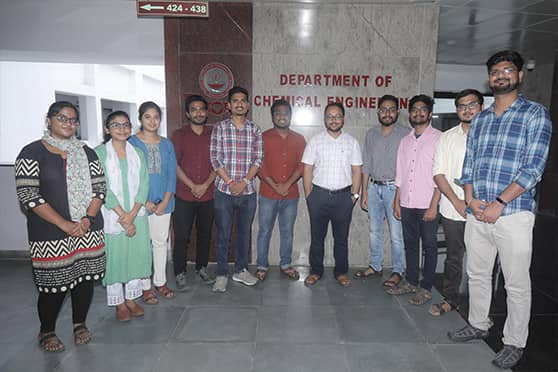IIT Madras researchers use AI tools to study methods to produce fuel from biomass


Indian Institute of Technology (IIT) Madras researchers are using Artificial Intelligence (AI) tools to study the processes involved in conversion of biomass to gaseous fuel. With increasing environmental concerns associated with petroleum-derived fuels, biomass is a practical solution as a source of energy-dense fuel.
The research was led by Himanshu Goyal, an assistant professor at the department of Chemical Engineering, IIT Madras and Niket S Kaisare, a professor at the same department.
Researchers all over the world are finding methods to extract fuel from biomass such as wood, grass, and even waste organic matter. Gaining such understanding through hands-on experiments is time-consuming and expensive. Computer simulations and modelling studies can provide quicker insights that can be used to build the processes and plants for biomass processing.
Such biomass-derived fuel is particularly relevant to India. The current availability of biomass in India is estimated at about 750 million metric tonnes per year and extracting fuel from them can tremendously help the country attain fuel self-sufficiency.
Explaining the importance of such studies, Goyal said, “Understanding the complex mechanisms involved in the conversion of raw biomass into fuel is important for designing the processes and optimizing reactors for the purpose. There is an urgent need to train the next generation of engineers on high-performance computing and machine learning skills so that they can address some of the biggest challenges before us, such as developing zero-emission technologies to tackle climate change. This work is one such example.”
Models are being developed all over the world to understand the conversion of biomass into fuels and chemicals, but most of them take a long time to become operational. AI tools such as Machine Learning (ML) can hasten the modelling processes.
The IIT Madras research team used an ML method called Recurrent Neural Networks (RNN) to study the reactions that occur during the conversion of lignocellulosic biomass into energy dense syngas (gasification of biomass).
Kaisare elaborated, “The novelty of our ML approach is that it is able to predict the composition of the biofuel produced as a function of the time the biomass spends in the reactor. We used a statistical reactor for accurate data generation, which allows the model to be applied over a wide range of operating conditions.”
Goyal’s research group uses AI tools not just for biomass-biofuel conversion studies but also for socially relevant and environmentally beneficial processes such as carbon capture (the capture of CO2 to prevent climate change) and the electrification of the chemical industry.
Recent results of their modelling studies were published in the peer-reviewed Royal Society of Chemistry journal, Reaction Chemistry and Engineering. The research paper has been co-authored by Goyal, Kaisare and Krishna Gopal Sharma, a fourth Year BTech student at the department of Computer Science and Engineering, IIT Madras.